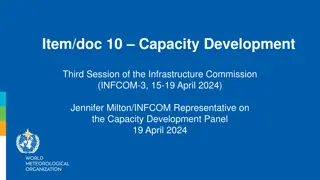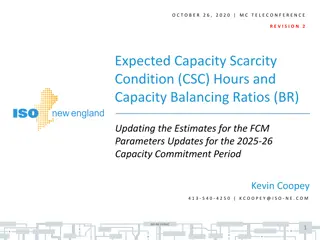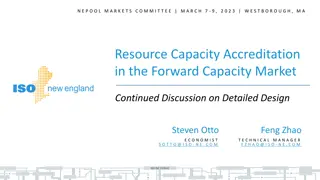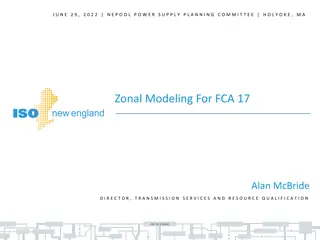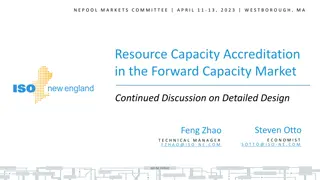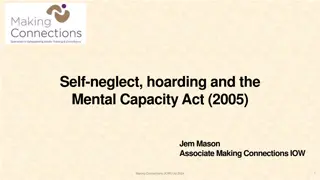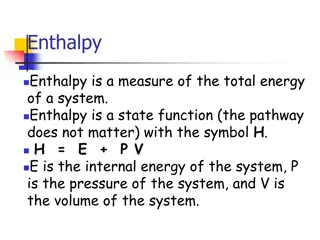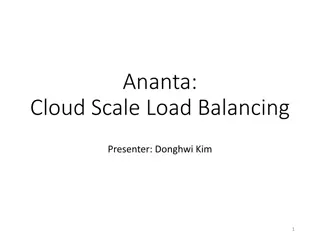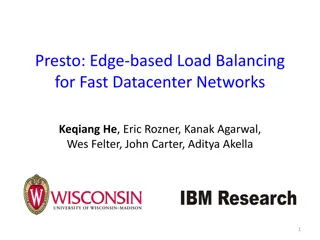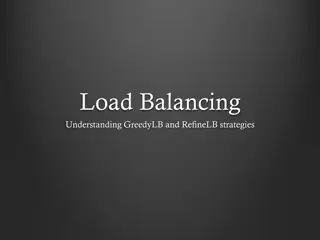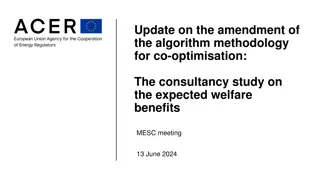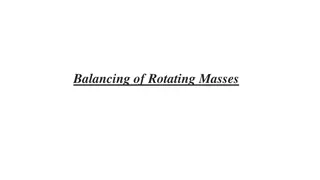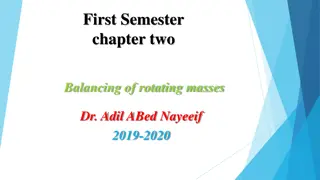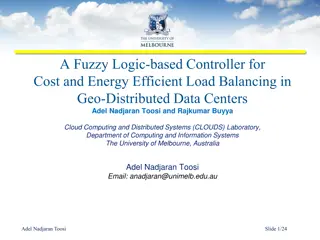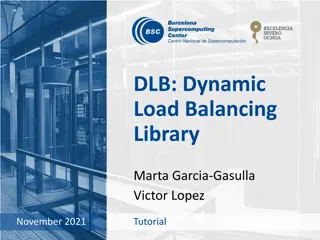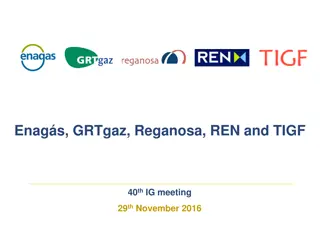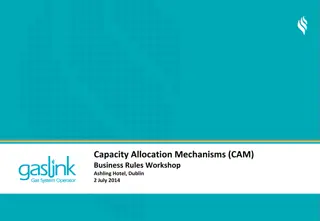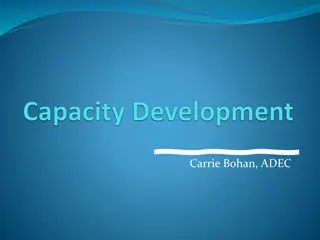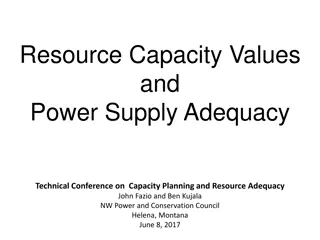INFCOM Capacity Development Initiatives Overview
INFCOM's capacity development initiatives focus on enhancing Earth system observations, closing capacity gaps on weather services, and supporting new opportunities in competencies and capabilities. Collaboration and coordination mechanisms have been established to facilitate sharing of information a
0 views • 11 slides
Understanding Balancing of Reciprocating Masses in Engines
Learn about the balancing of reciprocating masses in engines, including the importance of balancing primary and secondary forces in multi-cylinder in-line engines. Discover how crank angles and cylinder arrangements contribute to balancing forces for optimal engine performance.
0 views • 6 slides
Update on Expected Capacity Scarcity Hours and Balancing Ratios for 2025-26
Presentation providing updates on the Expected Capacity Scarcity Hours and Balancing Ratios for the upcoming 2025-26 Capacity Commitment Period. The focus is on adjusting estimates based on new data for peak load scarcity hours, introducing a smoothing mechanism, and aligning with the recent FCM Par
0 views • 24 slides
Resource Capacity Accreditation in Forward Capacity Market Overview
Resource Capacity Accreditation project aims to enhance ISO-NE's accreditation processes in the Forward Capacity Market, supporting a reliable, clean-energy transition. Key concepts covered in this educational presentation include accreditation space, methods, benefits, challenges, and improvement o
1 views • 53 slides
Resource Capacity Accreditation in the Forward Capacity Market Discussion
The presentation discusses improvements in the Resource Capacity Accreditation project of ISO-NE's Forward Capacity Market to support a reliable, clean-energy transition. It includes details on seasonal components, reconfiguration auctions, trading obligations, and stakeholder schedules. Examples pr
3 views • 71 slides
Capacity Zone Modeling for Forward Capacity Auction 17 Results
This presentation unveils the Capacity Zone modeling calculations for Forward Capacity Auction 17 associated with the 2026-2027 Capacity Commitment Period by ISO-NE PUBLIC. It delves into boundary definitions, import-constrained zone modeling, and market rules guiding the assessments and modeling pr
0 views • 16 slides
Proposal for Resource Capacity Accreditation in Forward Capacity Market
The ISO-NE has proposed improvements to the accreditation processes in the Forward Capacity Market (FCM) through the Resource Capacity Accreditation (RCA) project. The aim is to enhance the accreditation of resource contributions to ensure reliability during the transition to a cleaner energy mix. T
0 views • 59 slides
Understanding Balance of Power Theory in Global Politics
Balance of Power Theory in global politics emphasizes the distribution of military capability among states to prevent hegemony and maintain national security. It is a realist theory that highlights the importance of preventing any single state from dominating others. The theory discusses how stronge
1 views • 15 slides
Roadmap for DNS Load Balancing Service at CERN - HEPiX Autumn 2020 Workshop
This roadmap presented by Kristian Kouros on behalf of the DNS Load Balancing Team at CERN outlines the introduction, implementation, and upgrades associated with the DNS Load Balancing Service. It covers topics such as system architecture, LBClient metrics, and the overall structure of the service.
3 views • 29 slides
Resource Capacity Accreditation in the Forward Capacity Market: Continued Discussion and Detailed Design
The Resource Capacity Accreditation (RCA) project by ISO-NE aims to enhance accreditation processes in the Forward Capacity Market (FCM) to support a reliable, clean-energy transition. This presentation focuses on seasonal components of Capacity Supply Obligations (CSO), Pay-for-Performance (PFP) ob
0 views • 58 slides
Understanding Dynamic Propeller Balancing with ProBalancer Sport
Explore the importance of dynamic propeller balancing using the Model 1015 ProBalancer Sport. Learn about vibration basics, balancing benefits, and fundamentals of using the ProBalancer Sport for propeller balancing. Discover how vibration affects aircraft components, leading to issues like engine f
0 views • 68 slides
Understanding Self-Neglect, Hoarding, and the Mental Capacity Act (2005)
Self-neglect and hoarding are complex issues often intertwined with mental capacity challenges. The Mental Capacity Act (2005) outlines capacity assessments, decision-making criteria, and challenges faced by professionals in safeguarding individuals. Recognizing the need for trauma-informed care in
1 views • 16 slides
Understanding Legal and Mental Capacity in Healthcare Decisions
Clinical specialist occupational therapist, Louise Lawlor, advocates for patients' rights and decision-making capacity in healthcare settings. She emphasizes the importance of legal and mental capacity in making informed decisions, highlighting relevant legislation, guidance documents, and a functio
0 views • 24 slides
Exploring Capacity and Volume in Practical Settings
Explore the concepts of volume and capacity through engaging activities involving measuring liquid in containers, understanding units like milliliters and liters, and solving capacity-related questions. Discover how to work out different measurements and practice practical capacity in the kitchen wi
0 views • 7 slides
Understanding Enthalpy and Heat Capacity in Chemistry
Enthalpy is a measure of total energy in a system, represented as H = E + P.V. Heat at constant pressure relates to enthalpy changes. Calorimetry and heat capacity help measure and understand heat in chemical reactions. Specific heat capacity and molar heat capacity play key roles in determining ene
0 views • 16 slides
Workshop on New Approaches to Statistical Capacity Development in Lao PDR
This workshop, hosted by PARIS21 and UNDP, focuses on enhancing statistical capacity development in Lao PDR. It covers topics like successful capacity development programs, partnerships for national statistics development, and prioritizing needs versus international requirements. The Lao Statistics
0 views • 15 slides
Dynamic Load Balancing on Graphics Processors: A Detailed Study
In this comprehensive study by Daniel Cederman and Philippas Tsigas from Chalmers University of Technology, the focus is on dynamic load balancing on graphics processors. The research delves into the motivation, methods, experimental evaluations, and conclusions related to this critical area. It cov
0 views • 57 slides
Cloud Load Balancing Overview and Requirements
This content provides a detailed overview of cloud-scale load balancing, involving components like servers, hypervisors, VMs, VIPs, DIPs, and the role of load balancers in distributing workloads efficiently. It also discusses communication flows involving VIPs, DIPs, front-end VMs, back-end VMs, and
0 views • 35 slides
Presto: Edge-based Load Balancing for Fast Datacenter Networks
Datacenter networks face challenges with network congestion affecting both throughput-sensitive elephants and latency-sensitive mice traffic. This paper discusses the problem, existing traffic load balancing schemes, and proposes an edge-based solution called Presto to address network congestion pro
0 views • 76 slides
Understanding GreedyLB and RefineLB Load Balancing Strategies
Explore the GreedyLB and RefineLB load balancing algorithms, their implementation steps, utilization before and after load balancing, object migration statistics, and cost considerations. Learn how the strategies optimize the mapping of objects to processors for efficient load balancing.
1 views • 21 slides
Update on Algorithm Methodology for Co-optimisation Study
This update focuses on a consultancy study aimed at quantifying potential welfare gains in co-optimisation strategies. It outlines the goals, team composition, and key aspects of the modelling process, emphasizing the benefits of joint day-ahead clearing of balancing capacity and energy. The study d
0 views • 13 slides
Dynamic Load Balancing in Block-Sparse Tensor Contractions
This paper discusses load balancing algorithms for block-sparse tensor contractions, focusing on dynamic load balancing challenges and implementation strategies. It explores the use of Global Arrays (GA), performance experiments, Inspector/Executor design, and dynamic buckets implementation to optim
1 views • 32 slides
Changes in Capacity Allocation Regulations for Gas Infrastructures in Portugal
The new regulation in Portugal brings significant changes in capacity booking and trading to promote convergence with CAM NC and enable a secondary market. Major changes include ex-ante payment of capacity rights, capacity allocation via a booking platform, and enhancement of liquidity in the second
0 views • 13 slides
Understanding the Balancing of Rotating Masses in Machinery
Balancing rotating masses in machinery is crucial for optimal performance. The article covers different methods such as balancing with single and multiple masses in various planes, both graphically and analytically. Proper balancing helps reduce vibrations and ensures the smooth operation of high-sp
0 views • 9 slides
Balancing of Rotating Masses in Engineering
Balancing of rotating masses is crucial in engineering to prevent the effects of centrifugal force, vibrations, and shaft bending. The process involves attaching balancing masses to counteract the centrifugal forces of the primary masses. Different cases, such as balancing in the same plane or diffe
0 views • 24 slides
The Assisted Decision-Making (Capacity) Act 2015 in the Criminal Justice Context
The Assisted Decision-Making (Capacity) Act 2015 introduces key reforms such as the abolition of wards of court system for adults, a statutory functional test of capacity, new guiding principles, a three-tier framework for support, and tools for advance planning. It emphasizes functional assessment
0 views • 17 slides
Understanding Capacity Challenges in Wills: Legal Insights
Testators must possess mental capacity when making a will, as established in legal cases like Banks v. Goodfellow. The common law test for testamentary capacity remains relevant despite the Mental Capacity Act 2005. The Banks v. Goodfellow test outlines the required mental power for making a valid w
0 views • 18 slides
Fuzzy Logic Controller for Cost-Efficient Load Balancing in Data Centers
Large energy consumption in data centers leads to high operational costs and significant environmental impact. This study explores the challenges of using renewable energy sources for load balancing in geo-distributed data centers, proposing a fuzzy logic-based controller to optimize energy efficien
0 views • 24 slides
The Integral Role of Sustainability in Airport Capacity-Enhancing Projects
Sustainability plays a crucial role in airport capacity enhancement by providing numerous benefits such as cost savings, good relations with neighbors, efficient operations, employee satisfaction, and balancing competing interests. By integrating sustainability into projects like new runways, termin
0 views • 10 slides
Effective Daily Cash Balancing Procedures for Business Services
Implement a systematic process for daily cash balancing in business services to ensure financial accuracy and accountability. Steps include running queries, acquiring supporting documentation, entering information into balancing files, and investigating discrepancies for resolution. Emphasizing fina
0 views • 11 slides
Chemical Reactions and Stoichiometry in AP Chemistry
Chemical reactions involving stoichiometry play a crucial role in AP Chemistry. Understanding how atoms are rearranged, mass is conserved, and energy is exchanged is essential for balancing chemical equations. Examples include the thermite reaction, combustion of methane, and reactions like synthesi
0 views • 38 slides
Dynamic Load Balancing Library Overview
Dynamic Load Balancing Library (DLB) is a tool designed to address imbalances in computational workloads by providing fine-grain load balancing, resource management, and performance measurement modules. With an integrated yet independent structure, DLB offers APIs for user-level interactions, job sc
0 views • 27 slides
Somerset Mental Capacity Training Session June 2023
This information outlines a mental capacity drop-in session for care providers in June 2023, hosted by Chris Hamilton from Somerset Council. It covers topics like the aim of the Mental Capacity Act, the Somerset mental capacity competency framework, and the importance of staff training. It emphasize
0 views • 21 slides
Stakeholders Concerns and Feedback on Balancing Capacity Standard Products
General stakeholders' concerns and feedback on standard products for balancing capacity, as outlined in the Mats Elmer PT SPBC convener's proposal, are highlighted. The proposal aims to support a level playing field for balancing capacity cooperation, welcome all technologies, and respect EB.GL requ
0 views • 8 slides
The Problem with Balancing in Legal and Ethical Frameworks
The content discusses the limitations and drawbacks of the concept of balancing in legal and ethical contexts, focusing on the theoretical instability, moral implications, and intellectual laziness associated with it. Using the example of the Delfi case, it highlights the challenges and conflicts ar
0 views • 18 slides
EFET Considerations on XB Capacity Reservation for Balancing
EFET opposes TSOs reserving XB transmission capacity for balancing due to inefficiencies and missed opportunities in energy markets. Co-optimisation proposals face challenges in bid linking and uncertainty, impacting capacity allocation and balancing procedures. Stronger leadership from ENTSO-E is n
0 views • 4 slides
Gas Interconnection Agreements and Balancing Implementation Insights
Gas industry stakeholders Enags, GRTgaz, Reganosa, REN, and TIGF collaborated on various public consultations and discussed the implementation of Balancing Network Codes. Key topics include interconnection agreements, exceptional event situations, local products for balancing services, and the publi
0 views • 13 slides
Capacity Allocation Mechanisms (CAM) Business Rules Workshop Summary
This summary provides insights into the Capacity Allocation Mechanisms (CAM) Business Rules Workshop held at Ashling Hotel, Dublin on July 2, 2014. The workshop covered topics such as CAM business rules scope, key features, auction processes, code modifications, implementation timelines, and consult
0 views • 32 slides
Understanding Capacity Development in Water Systems
Capacity development is crucial for water systems to acquire and maintain technical, managerial, and financial capabilities in order to consistently provide safe drinking water. Federal requirements mandate new public water systems to demonstrate capacity, with states required to have strategies to
0 views • 8 slides
Resource Capacity Values and Power Supply Adequacy Conference Highlights
Explore insights from the Resource Capacity Values and Power Supply Adequacy Technical Conference, covering topics like integrated vs. standalone capacity values, utilizing hydro storage to increase capacity, and the 2021-22 Adequacy Summary. Learn about the importance of integrated capacity values
0 views • 9 slides
